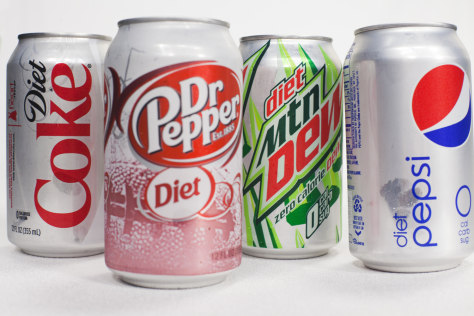How many people do you know who lost weight simply by switching from Coke to Diet Coke?
Probably not many.
That’s because unless followed by other lifestyle changes, choosing diet drinks is absolutely useless.
Diet Soda – What Exactly is it?
Diet sodas are carbonated beverages.
Instead of sugar, they are sweetened with artificial sweeteners like aspartame, cyclamate, saccharin, acesulfame-k or sucralose.
Almost every popular sugar-sweetened beverage on the market has a “light” or a “diet” version… Diet Coke, Pepsi Max, Sprite Zero, etc.
These drinks are calorie free, which technically should help people lose weight and prevent sugar-related diseases like metabolic syndrome and diabetes.
However, the evidence for these beverages having any use is completely nonexistent.
Diet Soda and The Metabolic Syndrome
The metabolic syndrome is a group of risk factors for disease that often occur together and raise your risk of diabetes, stroke and heart disease.
It is defined as having at least three of the following:
- Abdominal obesity (belly fat)
- High fasting glucose
- High triglycerides
- Low HDL cholesterol
- Elevated blood pressure
Drinking “calorie free” beverages instead of sugary ones does not appear to be helpful against the metabolic syndrome.
In a study published in the journal Circulation in 2008, which followed 9,514 people for 9 years, drinking artificially sweetened beverages was associated with a 34% greater risk of developing the metabolic syndrome.
Another study found a 36% increased risk of metabolic syndrome and a drastically increased risk of diabetes in diet soda drinkers.
Bottom Line: Observational studies show a correlation between diet soda and the metabolic syndrome, which can lead to serious diseases.
Diet Soda, Depression and Preterm Delivery
There is an association between diet soda and depression
In a study of 263,925 adults aged 51-70, individuals who drank soda were 30% more likely to be diagnosed with depression over a period of 10 years.
The link was stronger for diet soda than regular soda.
Diet soda is also associated with preterm delivery.
In a study of 59,334 pregnant women in Denmark, 1 serving per day of diet drinks was associated with a 38% increased risk of preterm delivery. 4 servings per day increased the risk by 78%.
Bottom Line: Diet soda consumption is strongly associated with both depression and preterm delivery.
Diet Soda and The Risk of Type II Diabetes
Type II diabetes has increased at an alarming rate in the past few decades and now afflicts about 300 million people worldwide.
This disease is highly associated with obesity and sugar consumption, so some would argue that replacing sugar-sweetened beverages with calorie-free drinks would help.
However, there is no evidence of these drinks being helpful against diabetes.
A study of 6,814 individuals aged 45-85 years, daily consumption of diet soda was associated with a 67% increased risk of type II diabetes.
In another study, 66,118 French women were followed for a total of 14 years. Women who consumed the most diet drinks had a 121% greater risk of developing type II diabetes.
Data analysis from two large Harvard studies revealed that diet drinks raised diabetes risk in women, but not men. Each daily serving increased the risk of a diabetes diagnosis by 6%.
Bottom Line: The association between diet soda and diabetes is very strong, especially in women. One study showed more than a doubling in risk.
Diet Soda, Obesity and Weight Gain
The main reason people switch to diet drinks is to cut back on calories in order to lose weight.
Unfortunately, it doesn’t seem to work.
In a study of 3,682 individuals from San Antonio, Texas, consumption of diet soda was associated with double the risk of becoming overweight or obese.
Other prospective studies also show an association with artificial sweeteners and weight gain.
However, we do have one randomized controlled trial, where 318 individuals were split into 3 groups: A control group, a group that replaced sugary soda with water and a group that replaced sugary soda with diet drinks:
At the end of the 6-month study, there was no significant difference between all three groups. In this controlled trial, diet soda didn’t make things worse, but didn’t make them better either. Neither did water.
I’d like to point out that many short-term feeding trials show that artificial sweeteners can increase appetite and food intake in the short-term compared to sugar, but other studies show the opposite effect or no effect at all.
Bottom Line: Observational studies show a strong link between diet soda and obesity, while one controlled trial shows no effect at all.
Take Home Message
Many of the studies above are so-called epidemiological studies, which can not prove that diet drinks caused anything. Such studies can only show an association.
Whether diet soda can cause harm or not has yet to be proven in controlled trials, but it is clear that there is a strong statistical association between diet soda and disease.
One possible explanation for the link is the fact that people who are already gaining weight are more likely to turn to diet drinks.
There is of course, no physiological need for these drinks in the diet, although many people tend to enjoy them.
I personally choose to avoid diet soft drinks, mainly because I don’t like the way I feel when I drink them and prefer to keep my body as free of artificial chemicals as possible.
Source
http://authoritynutrition.com/why-is-diet-soda-bad-for-you/






No comments:
Post a Comment